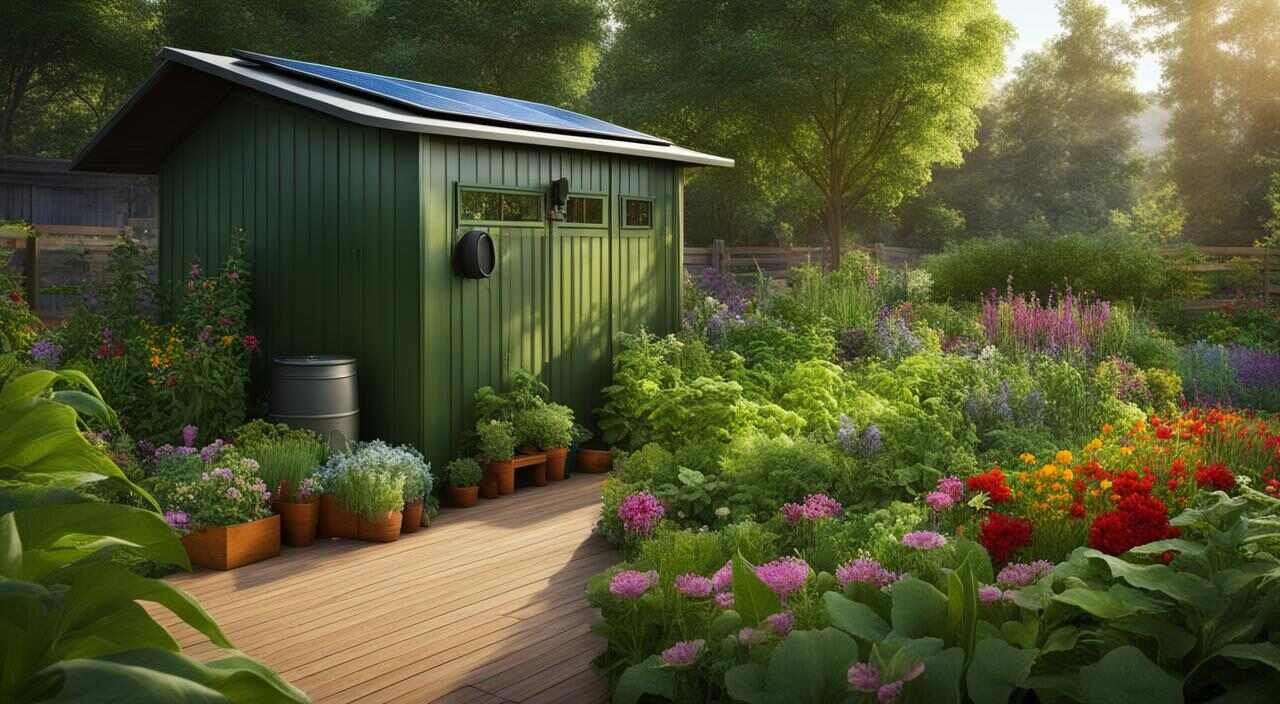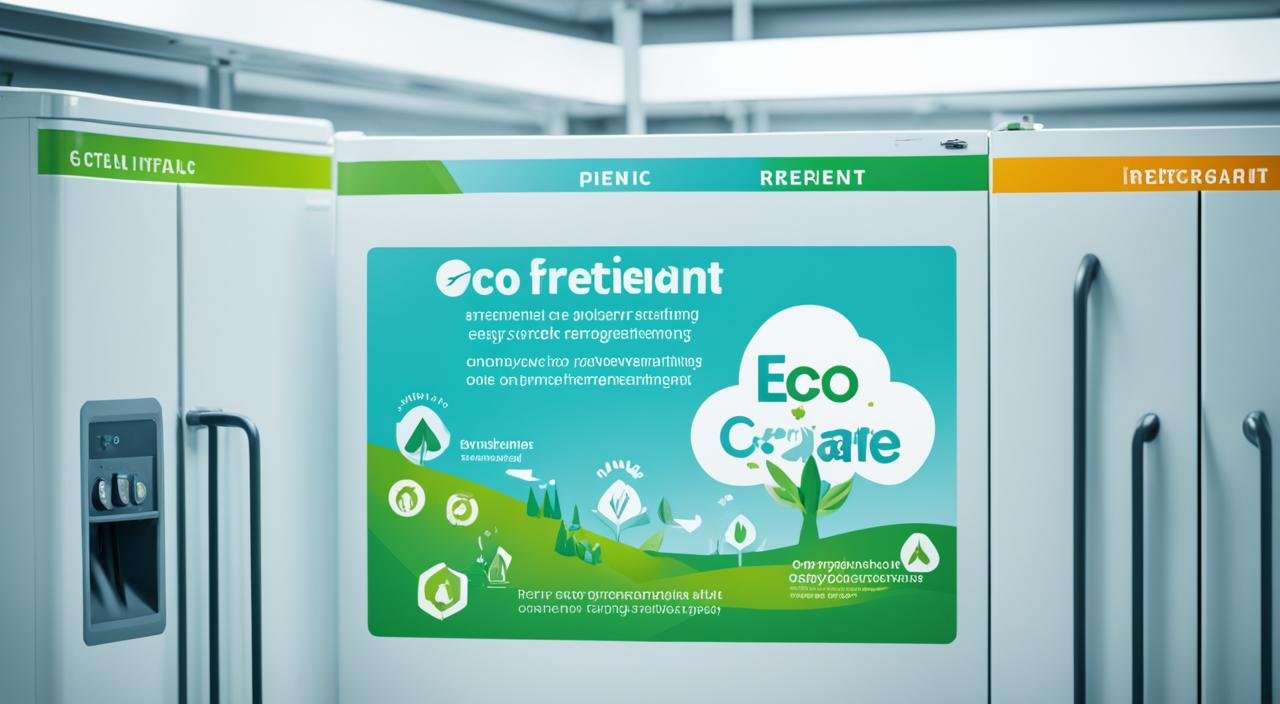Welcome to our comprehensive guide on eco friendly gardening tips for a greener yard. In this article, we will explore sustainable gardening practices that can help minimize your impact on the earth and create a more environmentally friendly outdoor space. Whether you are a seasoned gardener or just starting out, these tips will inspire you to adopt organic, green gardening practices that benefit both your yard and the planet.
Key Takeaways:
- Implementing sustainable gardening practices can minimize your impact on the earth and create a greener yard.
- Going organic, avoiding polluting chemicals, and building healthy soil with compost are integral to sustainable gardening.
- Choosing native plants suited to your region’s climate and reducing the area of grass in your lawn can save water and promote biodiversity.
- Collecting rainwater, growing your own sustainable food, and composting green waste contribute to an eco-friendly lifestyle.
- Sustainable gardening practices benefit not only your yard but also the environment at large.
What is Sustainable Gardening?
Sustainable gardening is a practice that aims to minimize humans’ impact on the earth. It involves avoiding the use of polluting chemicals in fertilizers and pest control, preserving natural resources, and reducing waste. By making small changes in your gardening practices, you can contribute to a more eco-conscious and environmentally friendly approach.
Going Organic and Building Healthy Soil
One essential element of sustainable gardening is going organic. By using fewer chemicals and opting for natural fertilizers and pest control methods, you can create a healthier environment for your plants and the surrounding ecosystem. Building healthy soil is another key aspect of sustainable gardening. Adding compost and organic matter to the soil improves its structure, fertility, and ability to retain moisture.
Mulching for Weed Prevention and Moisture Retention
Mulching is an effective practice in sustainable gardening. By adding a layer of organic mulch around your plants, you can prevent the growth of weeds, reduce the need for chemical herbicides, and retain moisture in the soil. Mulch also helps insulate the soil, keeping it cooler in hot weather and warmer in cold weather.
Planting Native Species for Conservation
Choosing native plants that are adapted to your region’s climate and soil types is a sustainable gardening practice. Native plants are more resistant to pests and diseases, require less water and maintenance, and provide food and habitat for native insects and birds. By supporting native biodiversity, you contribute to the conservation of local ecosystems.
Reducing Grass Areas and Using Rain Barrels
In sustainable gardening, reducing the area of grass in your yard can have multiple benefits. Grass requires regular mowing and watering, which consumes time and resources. Instead, consider replacing grass with easy-care plants or creating functional areas such as vegetable gardens or native plant beds. Installing rain barrels to collect and store rainwater is another sustainable practice that reduces water consumption and promotes efficient gardening.
Growing Sustainable Vegetables, Fruits, and Herbs
Growing your own food using sustainable vegetable gardening techniques is a rewarding and eco-friendly activity. You can control the use of pesticides and fertilizers, reduce food waste, and enjoy the freshness and flavor of homegrown produce. Consider planting organic seeds, rotating crops, and composting kitchen scraps to support a sustainable vegetable garden.
Composting and Green Waste Management
Composting is a vital component of sustainable gardening. It allows you to turn green waste, such as grass clippings, dead leaves, and kitchen scraps, into nutrient-rich compost that enriches the soil and reduces the need for chemical fertilizers. By composting, you minimize waste, nurture healthy plants, and contribute to sustainable gardening practices.
Using Manual or Electric Lawn-Care Equipment
Opting for manual or electric lawn-care equipment instead of gas-powered alternatives is an eco-friendly choice. Manual tools, such as push mowers and hand trimmers, require physical effort but produce zero emissions. Electric equipment, powered by rechargeable batteries or cords, also reduces pollution and noise levels in your garden.
By embracing sustainable gardening practices, you can create a more eco-conscious and environmentally friendly garden. Whether it’s choosing organic methods, conserving water, supporting native species, or composting green waste, every small step contributes to a greener future.
Please note: The inclusion of an image in this section visually represents the concept of sustainable gardening and acts as a visual cue for the readers. The image is centered and relevant to the topic but is not used for providing information or data.
Why is Sustainable Gardening Important?
Sustainable gardening is important because it aims to benefit the environment rather than harm it. By avoiding the use of polluting chemicals in fertilizers and pest control, sustainable gardening helps preserve natural resources and reduce waste. This not only contributes to a healthier planet but also creates a greener and more eco-friendly yard. Sustainable gardening practices can have a positive impact on your home, lawn, garden, and local ecosystem.
By growing native plants, reducing the area of grass in your lawn, and using less water, you can lower your air conditioning and heating bills, teach your children about being “green,” and reduce food waste through composting. Opting for sustainable gardening methods also benefits your lawn and garden by reducing the spread of invasive plant species, requiring less maintenance, and creating a safer environment for your family.
On a larger scale, sustainable gardening helps limit the spread of invasive species, reduce excess waste in landfills, and minimize water usage. Overall, sustainable gardening is important for creating a more sustainable and environmentally friendly living space.
How to Start a Sustainable Garden?
Starting a sustainable garden doesn’t have to be overwhelming. You can begin by making small changes and gradually shifting towards more sustainable practices. Here are some steps you can take to create an environmentally friendly garden:
- Go organic: Opt for natural weed-killing methods and organic solutions for pest control instead of using harmful chemicals. This promotes a healthier ecosystem and reduces the negative impact on the environment.
- Build healthy soil: Use compost to enrich your soil and improve its fertility. Composting organic waste not only reduces waste going to landfills but also provides essential nutrients for your plants.
- Mulch: Apply organic mulch to your garden beds to prevent weed growth, retain moisture in the soil, and improve overall soil health.
- Plant native: Choose native plants that are well-suited to your climate and soil conditions. They require less maintenance, water, and fertilizer while providing food and shelter for native insects and birds.
- Reduce grass areas: Consider reducing the area of grass in your lawn and replacing it with easy-care plants, groundcovers, or eco-friendly landscaping options. This reduces water consumption and the need for intensive maintenance.
- Conserve water: Install rain barrels to collect and use rainwater for your plants. This helps reduce water waste and provides a sustainable water source for irrigation.
- Grow your own food: Plant a sustainable vegetable garden to enjoy fresh produce while minimizing food waste and reducing your ecological footprint.
By following these practices, you can create a sustainable garden that contributes to a greener and more eco-friendly environment. It’s all about taking small steps and making conscious choices to protect our planet for future generations.
Tips for Water Conservation in Your Garden
Water conservation is an essential aspect of sustainable gardening, particularly in regions with water restrictions or scarcity. By implementing a few simple practices, you can minimize water usage in your garden and contribute to eco-friendly and green gardening practices.
To start, consider watering your garden during the coolest part of the day to reduce evaporation. This is typically in the early morning or late evening. By avoiding watering during the hottest hours, you can ensure that the water reaches the plants’ roots and is not lost to evaporation.
Another effective way to conserve water is by using hoses or drip irrigation systems instead of sprinklers. These methods allow for targeted watering directly at the plant’s base, minimizing water loss through evaporation and runoff.
An excellent method to utilize rainwater and reduce reliance on municipal water sources is installing a rain barrel. This collection system catches rainwater from gutters and downspouts, providing a free and sustainable water source for your garden. To maximize efficiency, place the rain barrel beneath a downspout to collect as much water as possible.
Choosing drought-tolerant plants for your garden is another effective strategy in water conservation. These plants have adapted to survive with minimal water requirements, reducing the need for frequent watering. Native plants are often naturally drought-tolerant and can thrive in your specific region’s climate and soil conditions.
Reducing the area of grass in your lawn can significantly decrease water usage. Grass requires regular watering to stay green and healthy, so consider replacing portions of your lawn with low-maintenance plants or groundcovers. These alternatives require less water and can still provide a visually appealing landscape.
Mulching is a crucial practice for water conservation in your garden. Apply a layer of mulch around your plants to retain soil moisture, reduce evaporation, and suppress weed growth. Organic mulches such as wood chips, straw, or compost are excellent options that also improve soil health as they break down over time.
Implementing these water conservation tips in your garden helps create a more sustainable and eco-friendly space. By minimizing water usage, you contribute to the preservation of precious resources and foster green gardening practices.
Sustainable Vegetable Gardening Tips
Sustainable vegetable gardening is an essential component of a sustainable lifestyle. By implementing eco-friendly practices, you can create a thriving vegetable garden while minimizing your environmental impact. Here are some valuable tips to help you grow a successful and sustainable vegetable garden:
- Plant Intensively and by Season: Optimize your garden space by sowing quick-sprouting crops in the spring, interplanting with hot-weather crops in the summer, and sowing cool weather crops again in the fall. This maximizes productivity and ensures that you make the most of each growing season.
- Choose Organic Seeds: Start your garden on an eco-friendly footing by selecting organic seeds. Organic seeds are untreated with chemicals and contribute to a healthier and more sustainable growing environment.
- Utilize Long-Lived Perennials: Incorporate long-lived perennial plants into your vegetable garden. Perennials adapted to your climate can provide continuous harvests over multiple years, saving you money and effort while producing bigger and better crops.
- Save Seeds: Sustainable gardening involves resourcefulness, and saving seeds from annual flowers allows you to reuse them in your garden the following year. This reduces waste and promotes the sustainability of your gardening practices.
- Compost Green Waste: Reduce waste and enrich your vegetable garden by composting green waste. Utilize kitchen scraps, dry leaves, and deadheaded flowers to create nutrient-rich compost that significantly boosts soil fertility.
By following these sustainable gardening tips, you can cultivate a productive vegetable garden that aligns with your eco-friendly values and promotes a greener future.
Crop Planting Guide
| Crop | Planting Season |
|---|---|
| Tomatoes | Spring, Summer |
| Lettuce | Spring, Fall |
| Zucchini | Spring, Summer |
| Carrots | Spring, Fall |
| Peppers | Spring, Summer |
Table: A guide to when vegetables should be planted throughout the year.
Sustainable Lawn Care Practices
Maintaining a sustainable lawn is crucial for eco-friendly gardening practices. By adopting sustainable lawn care practices, you can contribute to a greener and more environmentally friendly yard.
One essential aspect of sustainable lawn care is to minimize water usage, especially in areas with water restrictions. Xeriscaping, a landscaping method that reduces the need for watering, incorporates drought-tolerant shrubs and perennials. This not only conserves water but also creates an aesthetically pleasing landscape.
Another effective way to conserve water is by reducing the area of grass in your lawn. Instead of a traditional grass lawn, consider replacing portions with low-growing shrubs or groundcovers. These alternatives require less water and maintenance, making them eco-friendly choices for a sustainable yard.
When it comes to lawn care equipment, opt for manual or electric alternatives instead of gas-powered mowers and trimmers. By doing so, you can reduce your carbon footprint and limit noise pollution in your neighborhood.
Avoiding chemical-based products like fertilizers, herbicides, and pesticides is also essential for sustainable lawn care. Instead, opt for organic and natural alternatives that are safer for the environment, your family, and pets.
Using manual or electric lawn-care equipment instead of gas-powered mowers and trimmers can reduce your carbon footprint.
In summary, sustainable lawn care practices not only contribute to a greener and more eco-friendly yard but also promote water conservation, reduce environmental impact, and create a safer space for your family. By embracing these practices, you can enjoy a healthy and sustainable lawn that complements your sustainable gardening efforts.
| Sustainable Lawn Care Practices | Benefits |
|---|---|
| Minimize water usage | Saves water and conserves natural resources |
| Utilize xeriscaping | Reduces the need for watering and creates an attractive landscape |
| Reduce grass area | Decreases water requirements and maintenance |
| Use manual or electric lawn-care equipment | Reduces carbon footprint and noise pollution |
| Avoid chemical-based products | Promotes a safer environment and minimizes negative environmental impact |
The Importance of Composting in Sustainable Gardening
Composting plays a crucial role in sustainable gardening, allowing you to transform green waste into nutrient-rich fertilizer for your garden. By composting materials such as grass clippings, deadheaded flowers, dried leaves, and kitchen scraps, you can create a sustainable and eco-friendly source of nutrients that nourishes your plants.
One of the key benefits of composting is its contribution to waste reduction. Instead of sending organic waste to landfills, where it produces harmful greenhouse gases, composting allows you to repurpose these materials, minimizing your environmental impact.
Another advantage of composting is its ability to improve soil quality. Compost enriches the soil with organic matter, enhancing its structure and fertility. This, in turn, promotes healthier plant growth and better moisture retention, reducing the need for frequent watering.
Getting started with composting is easy. You can build a compost pile in your backyard or use a compost bin for a more organized approach. By adding green and brown materials, keeping the compost moist, and regularly turning the pile to aid in decomposition, you can create nutrient-rich compost in a matter of months.
By incorporating composting into your gardening routine, you not only reduce waste and improve soil health but also contribute to a healthier planet. Composting is an essential practice in sustainable gardening, ensuring that you maintain an environmentally friendly and eco-conscious approach to your gardening endeavors.
| Benefits of Composting in Sustainable Gardening | How Composting Contributes to Sustainability |
|---|---|
| 1. Reduces waste sent to landfills | 1. Repurposes organic waste instead of contributing to greenhouse gas emissions |
| 2. Improves soil structure and fertility | 2. Enhances moisture retention, reducing the need for frequent watering |
| 3. Provides nutrient-rich fertilizer for plants | 3. Reduces reliance on synthetic fertilizers, minimizing pollution |
| 4. Promotes a healthier ecosystem | 4. Supports beneficial microorganisms and a diverse range of soil organisms |
Conclusion
In conclusion, incorporating eco-friendly gardening tips and adopting sustainable gardening practices is crucial in creating a greener and more environmentally friendly yard. By avoiding the use of polluting chemicals and instead opting for natural weed-killing methods and organic gardening, you can have a positive impact on the planet. Additionally, preserving natural resources and minimizing waste contribute to a more sustainable approach to gardening.
Choosing native plants that are well-suited to your region’s climate and soil conditions not only promotes biodiversity but also conserves water. Reducing the area of grass in your lawn and implementing water-saving techniques such as using rain barrels, can greatly reduce water usage and help create an eco-friendly garden. Composting green waste provides nutrient-rich fertilizer, minimizing the need for artificial fertilizers and reducing waste sent to landfills.
By incorporating these eco-friendly gardening practices, such as using manual or electric lawn-care equipment and practicing sustainable vegetable gardening, you can create a lush, green space that aligns with sustainable living. Overall, embracing these green gardening practices will not only beautify your yard but also contribute to a healthier environment for generations to come.
FAQ
What are some eco-friendly gardening tips?
Some eco-friendly gardening tips include avoiding the use of polluting chemicals, using organic methods, composting green waste, and using manual or electric lawn-care equipment.
What is sustainable gardening?
Sustainable gardening is a practice that aims to minimize humans’ impact on the earth by avoiding the use of polluting chemicals, preserving natural resources, and reducing waste.
Why is sustainable gardening important?
Sustainable gardening is important because it benefits the environment, creates a greener yard, conserves natural resources, and reduces waste.
How can I start a sustainable garden?
You can start a sustainable garden by going organic, using natural weed-killing methods, building healthy soil with compost, planting native plants, reducing grass areas, using rain barrels, and growing your own sustainable vegetables.
What are some tips for water conservation in my garden?
Some tips for water conservation in your garden include watering during the coolest part of the day, using hoses or drip irrigation systems, installing rain barrels, choosing drought-tolerant plants, and mulching to retain moisture.
What are some sustainable vegetable gardening tips?
Some sustainable vegetable gardening tips include planting intensively and by season, choosing organic seeds, incorporating long-lived perennials, saving seeds, and composting green waste.
What are some sustainable lawn care practices?
Some sustainable lawn care practices include reducing water usage, using manual or electric lawn-care equipment, choosing drought-tolerant plants, and minimizing the use of chemical-based products.
Why is composting important in sustainable gardening?
Composting is important in sustainable gardening because it turns green waste into nutrient-rich fertilizer, reduces waste sent to landfills, and promotes healthy soil.





